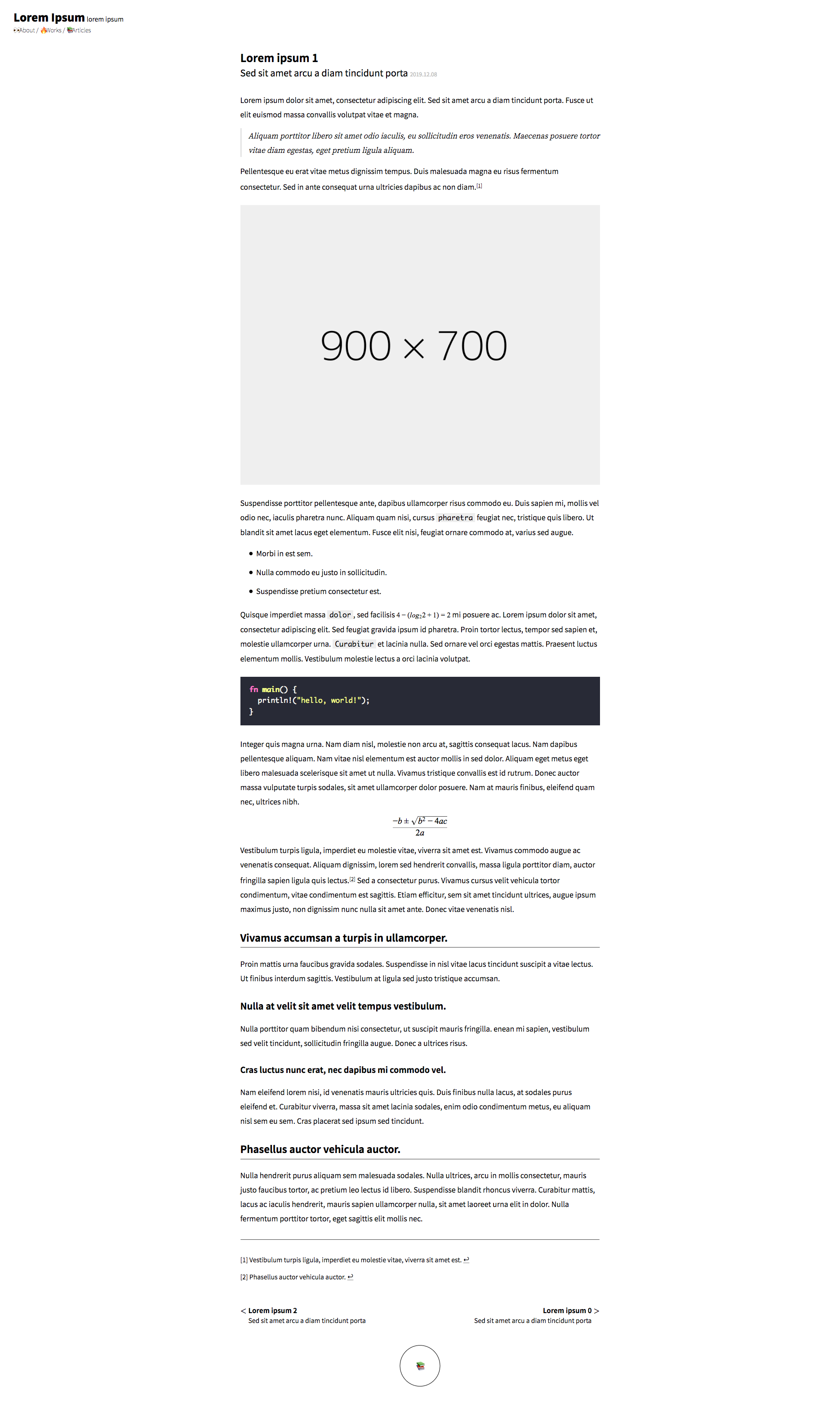ravenkyu.github.io
✍️ Handmade Blog [](https://github.com/parksb/handmade-blog/actions?query=workflow%3A%22Node+CI%22)  [](https://handmade-blog.netlify.com/) [](LICENSE)
Read this document in another language: [:kr:](_docs/README-KO.md) [:indonesia:](_docs/README-ID.md) [:brazil:](_docs/README-PT-BR.md) [:it:](_docs/README-IT.md) [:malaysia:](_docs/README-MS.md) [:greece:](_docs/README-EL.md) [:vietnam:](_docs/README-VI.md)Handmade Blog is a lightweight static blog generator for people who want to start a blog quickly. It supports article type document for a blog post, work type document for portfolio, code highlights, KaTeX syntax, footnotes, and more.
Demo: Here

Showcase
- betty-grof.github.io: https://github.com/betty-grof/betty-grof.github.io
- parksb.github.io: https://github.com/parksb/parksb.github.io
Lighthouse results
article/0.html on mobile

article/0.html on desktop

Getting Started
-
Click the ‘Use this template’ button above the file list to create a new repository. If you want to use github.io domain, have to name the repository
{YOUR_ID}.github.io. (e.g.,betty-grof.github.io) Don’t forget to enable the ‘Include all branches’ option.

-
Click the ‘Settings’ tab in your repository, and set the source branch for GitHub Pages to
gh-pagesbranch. GitHub Pages will host your website based ongh-pagesbranch. You’ll be able to access the website viahttps://{YOUR_ID}.github.io/in a few minutes.

-
Clone the repository, and install node packages.
shell script $ git clone https://github.com/{YOUR_ID}/{REPOSITORY_NAME}.git # git clone https://github.com/betty-grof/betty-grof.github.io.git $ cd {REPOSITORY_NAME} # cd betty-grof.github.io $ npm install -
Customize a some texts such as title of the navigation(in
app/templates/navigations.ejs), and runnpm run build.<nav> <a class="logo-link" href="/"> <h1>CUSTOMIZED BLOG TITLE</h1> <span>customized blog subtitle</span> </a> <small> <a id="about" class="info-link" href="/about.html">👀About</a> / <a id="works" class="info-link" href="/works.html">🔥Works</a> / <a id="articles" class="info-link" href="/articles.html">📚Articles</a> </small> </nav>shell script $ npm run build -
Run
npm startscript to start a local server listening onhttp://localhost:8080/. The local server is based ondistdirectory.shell script $ npm run build $ npm start
-
Commit and push the changes in your working directory to the remote repository.
shell script $ git add ./app/templates/navigations.ejs $ git commit -m "Customize the blog title and subtitle" $ git push origin master -
Run
deployscript if you’re ready to host the website. This script builds local files todistdirectory and pushes it togh-pagesbranch that contains only the files indistdirectory. GitHub Pages will host your website athttps://{YOUR_ID}.github.io/based ongh-pagesbranch automatically.shell script $ npm run deploy
Usage
Live reloading
- Run
npm run watchto track changes in real time. - Run
npm startto start local server. (npm run watchmust still be running in the background or other tab, or other session.) - Now, it is built automatically whenever you make changes to any files in
app/templates,app/styles, and_articlesdirectories.
Writing and publishing document
- Write a document in
_articlesor_worksdirectory. - Run
npm run publish articleornpm run publish workscript to convert markdown documents to HTML. - Preview converted document on the local server using
npm startscript. - Commit and push the changes to the repository, and run
npm run deployto deploy.
Editing template
Modify an ejs template to change the contents of the existing page. For example, if you want to put an image to the landing page, open the app/templates/index.ejs file, and add img tag to the main-container element.
<main id="main-container">
<img src="../assets/profile.jpg" alt="My profile picture" />
<p>Lorem ipsum dolor sit amet, consectetur adipiscing elit.</p>
</main>
Then, run npm run build script to publish the modified landing page and preview changes on the local server using npm start script.
```shell script $ npm run build $ npm start
If you're ready to deploy, run `npm run deploy` script. You can change not only the landing page but any pages like this way. (You may need to understand the project structure.)
### Adding a custom domain
Create a CNAME file in the root directory. The build process will automatically pick up on the CNAME for you and you can serve your blog from your custom domain.
To find out more about how Github manages CNAMEs, check out the [docs](https://docs.github.com/en/pages/configuring-a-custom-domain-for-your-github-pages-site/managing-a-custom-domain-for-your-github-pages-site)
## Project structure
* `_articles` - Markdown files for the blog posts.
* `_works` - Markdown files for the portfolio.
* `app`
* `assets` - Any files to be imported by HTML files such as image, font, etc.
* `public` - HTML files generated by `publish` script. `server` and `dist` directory is based on this directory. Do not change the files under this directory directly.
* `article` - HTML files converted from `_articles` directory.
* `work` - HTML files converted from `_works` directory.
* `styles` - CSS source code to be imported by HTML files.
* `static` - Any static files that aren't compiled by `build` script like `robots.txt`, `sitemap.xml`, or SEO files. `build` script copies all files under this directory to `dist` directory.
* `templates` - EJS template files. `publish` script converts templates under this directory to HTML files.
* `dist` - Files compiled by `build` script. `start` script opens local server based on this directory, and `deploy` script deploys a website to GitHub pages based on this directory. Do not change the files under this directory directly.
* `services` - Source code implementing `publish` script.
* `classes`
* `models`
* `tools` - Source code implementing various npm scripts.
## Available Scripts
### `npm start`
Starts local development server listening on http://localhost:8080/.
### `npm run publish`
Converts templates to HTML files.
```shell script
$ npm run publish article
Converts all articles.
```shell script $ npm run publish works
Converts all works.
```shell script
$ npm run publish article 5
Converts an article which id is 5.
```shell script $ npm run publish work 3
Converts a work which id is 3.
```shell script
$ npm run publish page
Converts all pages.
npm run watch
Rebuilds template files in templates directory, css files in styles directory and markdown files in _articles directory automatically whenever the files are modified.
npm run build
Builds files with parcel bundler.
npm run deploy
Builds and deploys the files.
License
This project is licensed under the MIT License - see the LICENSE file for details.